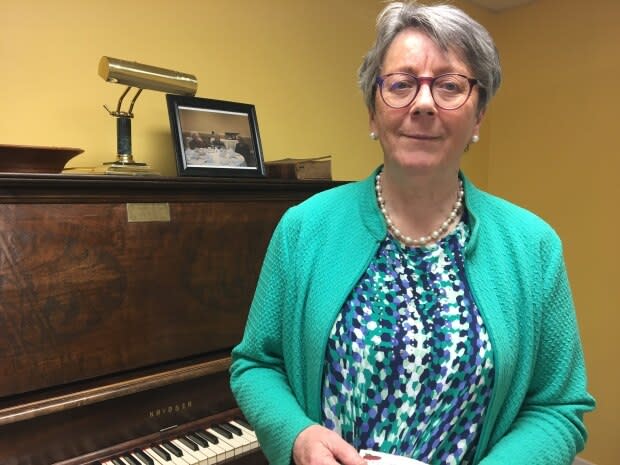P.E.I. Parkinson's group refuses to give up efforts during pandemic
A local Parkinson's group is running into some unforeseen obstacles in their effort to continue offering clients crucial services during the COVID-19 pandemic.
Back in March, before being forced to drop all in-person group activities, the P.E.I. chapter of Parkinson Canada offered four types of in-person therapy sessions to its members — exercise, singing, boxing and a support group.
"With COVID, we had to close down everything," said Irene Doyle, the P.E.I. chapter's chair. "It's difficult."
Doyle said they managed to transform the support group into a phone format. But because members couldn't see who was speaking, the service didn't provide the same degree of connection.
Then, Doyle thought the online video call platform Zoom could be a solution. The problem? An attempt to move in that direction revealed some members didn't have computers.
To combat that, Doyle put a call out on Facebook for technology donations — and then she hit her biggest challenge yet.
"I thought, 'Oh my golly, you don't even have the internet.' So what good is a tablet if you don't even have the internet?"
Doyle estimates that around 20 per cent of the P.E.I. members who regularly partake in group therapy would be unable to attend online sessions because they lack the technical resources.
Exercise is 'like a drug' for patients
While there is no cure for Parkinson's, Dr. Angela Roberts, who researches cognition in neurodegenerative disorders, said exercise is no longer optional for patients but downright required.
"It's like a drug," said Roberts.
"Just as we wouldn't stop taking a drug suddenly, we wouldn't want to stop things like exercise."

According to Roberts, studies have shown that regular movement can have a similar effect to prescribed medications when it comes to increasing dopamine levels in the brain.
"Without social interaction and without exercise, we may actually find that cognitive impairments are more problematic for people."
'Something is better than nothing'
Another researcher agrees.
"Exercise can be similar to the effectiveness of some medications," said Dr. Philip Miller, who studies the benefits of exercise periods for people with Parkinson's.
"If they are not able to do any of that, then they may have some reversions of those benefits — increasing potential fatigue or physiological changes or potential motor changes."
People need to know that they're not alone in the world. - Irene Doyle, Parkinson's Canada P.E.I. Chapter
According to Miller and Roberts, movement will not cure the disease. But it can slow the progression.
"Sometimes it can be very daunting for people," said Miller. "Exercise can be anything where you're moving around and elevating your heart rate.
"Something is better than nothing."
And that "something" is what has been missing for many Islanders with Parkinson's since the pandemic hit.
'Strength of their speech has dropped'
Shona Pottinger, who teaches music therapy with the P.E.I. chapter, has seen the impact first hand.
"By maintaining that vocal strength and maintaining the muscles in the face, we can help them to be able to continue to communicate with their loved ones," she said.

Without the weekly class, Pottinger said some have told her that "the quality and the strength of their speech has dropped."
Researchers are unsure if members can make up for that lost time once in-person therapy is allowed to resume.
Roberts said there is reason to believe that even if some people lose skills, once they return to an exercise program, they "can help to rebuild what was lost."
But Miller said that even though there are examples of people having a rapid return of benefits after a break, since the goal is to slow progression, whether you can "get a reversal after a long hiatus" is not entirely clear.
'Off to the races'
Pottinger has taught the singing class in person for around four years. Last Friday — with the help of a summer student — she tried teaching it over Zoom for the first time.
"It goes really well," said Pottinger. "Once everybody is logged in, everybody can see me, I can see everybody and they all mute their audio … we're off to the races."
But even with Zoom, the social interaction isn't quite there.
"People need to know that they're not alone in the world," said Doyle.
"It's very difficult for somebody to say, 'O.K., I need to get up every day and do this and this and this,' if they don't have a program or a destination."
So with no answer in sight on how to navigate a world struck by a global pandemic and relying on internet connections, Doyle still refuses to give up.
"We haven't gotten to that stage yet," she says with a laugh. "We're hoping and praying that there will be a vaccine."
More from CBC P.E.I.

